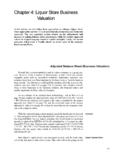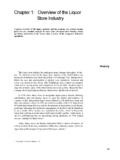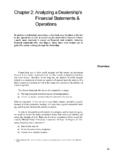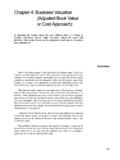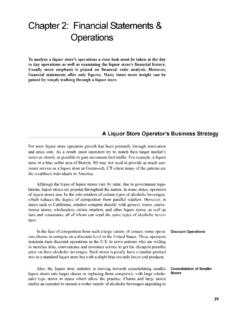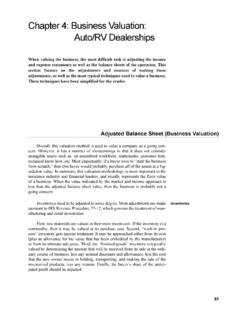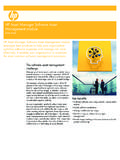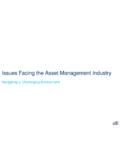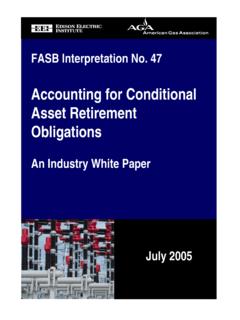Transcription of Chapter 15: Selling a Business: Asset vs. Stock Sale
1 329 Chapter 15: Selling a business : Asset vs. Stock SaleThe purchase price of a business can depend on whether or not the sale is astock or Asset sale. For corporations, sellers always want to sell Stock , whilebuyers always want an Asset sale. While contingent liabilities are a factor,the sale preference by the buyer and seller is almost always contingentupon the tax ramifications of each type of are different methods to structuring a deal, such as mergers, consoli-dations, ESOP assisted deals, Stock swaps, recapitalizations, all cash deals,installment sales, tax-free sales, and on and on. However, most small businesssales are typically divided into a Stock or an Asset sale. These types of sales rep-resent perhaps 80-90% of all middle market transactions and are the focus ofthis and Stock SaleMost buyers will only purchase the assets of a business when it has limitedmanagement (1 or 2 key people), and no special niche in the market.
2 At theother end of the spectrum are companies with a diverse management team,strong sales force, and a market niche. This second type of company has a man-agement team which will most probably stay after a sale. In this case buyers willtypically purchase the Stock or assets, but will pay higher multiples of Selling a corporation, one must decide whether the company shouldbe sold based upon an Asset sale or a Stock sale. Partnerships and sole propri-etorships are only sold based upon an Asset sale. The dilemma and complexityarises when a corporation (C or S) sells its assets or Stock . In the case of corpo-rations, differences between the two sale methods result in substantial differ-ences in taxes. For a corporation, the legal and tax ramifications can be seen inTable 15-1. These tax and legal issues will be discussed later in the a business : Asset vs.
3 Stock Sale330 The buyer s and seller s positions in an Asset versus a Stock sale, are sum-marized in Table 15-2 and Table 15-3. Table 15-1: Tax Versus Legal Aspects of Different Types of SalesLegalStockAssetsTax Is suesNontaxableSaleType A ReorganizationType B ReorganizationType C ReorganizationTaxable Sale338 TransactionStock SaleAsset AcquisitionTable 15-2: Buyer and Seller Position on a Stock SaleBuyer PositionSeller PositionAccounting/Tax AspectsBad: No step-up in basis; recapture taxon presale depreciation and investmenttax credits; but allows retention ofaccounting methods, and NOLs (net oper-ating losses) based upon : Avoids double taxation atthe corporate and shareholderlevel; provides capital gain/lossso that there is no need to calcu-late gain or loss by each Asset ;avoids ordinary gain; essentiallymakes corporate level tax conse-quences a buyer s ComplexityLess complex.
4 Transaction costs are shareholder approval;may require ex-spouse or otherparty not terminate labor contracts orallow altering of employee benefits (suchas unfunded employee benefit plans).Transfers all or most obligationsto liability, unemployment, andworker s compensation insurance needs to give consent to assump-tion of liabilities to buyer; but most likelydebt structure can be Retains ownership of name; retains exist-ing employee contracts and noncompeteagreements; retains contractual obliga-tions (leases, franchises).Seller cannot retain certain assets,unless disposed of before the a business : Asset vs. Stock Sale331 Aside from the preference for an Asset sale by the buyer, due to theunknown liabilities of a corporation, the tax consequences for both the buyerand seller are of primary importance.
5 The buyer wants an Asset sale in order tostep up the tax basis of the assets, while a seller wants a Stock sale to avoid thedouble taxation (taxation on the Asset basis and the Stock basis). An example ofthese two conflicting tax issues can best be seen in an Example of Tax Consequences of Asset vs. Stock SaleAssume that company S is Selling and that company B is buying. Assumethat the sale price company of S is $1,700,000. Steve (the owner, seller, and solestockholder) has a basis in his Stock of $510,000, and an Asset basis of $170,000(net of depreciation). The net (aftertax) proceeds to Steve, based upon either anasset sale or Stock sale, might look something like that seen in Table 15-3: Buyer and Seller Position on an Asset SaleBuyer PositionSeller PositionAccounting & Tax AspectsGood: step-up in basis of assets is acquiredfor assets purchased (assuming purchaseprice is higher than seller s basis); higherfuture deductions.
6 Recapture tax on presaledepreciation and investment tax credit paidby : taxed at corporate level, just as ifcompany liquidated; also, gains/lossesare based upon classification of eachasset and its ComplexityHigh: Difficult; nontransferable rights orassets cannot be transferred to buyer ( ,franchise, patent); more costly (each assettransferred needs new title, state sales taxmay apply); transaction costs are higher dueto the need for additional accounting, legaland appraisal : may require ex-spouse or otherparty approval; appraisals; , due to not assuming unknowncontingent liabilities; also buyer can termi-nate or modify employment contracts,employee benefit plans, or collective bar-gaining agreements; allows buyer to avoidminority shareholder problems that arisewith Stock , due to responsibility of of liability, unemployment, worker scompensation needs to consent to assumption will most likely have to financepart of the purchase Buyer can pick and choose assets; buyercan change state of incorporation; buyermay lose right to use corporation s name; Asset sale voids existing employee contractsand non-compete agreements (the flip sideis your employees may soon be your newcompetitors); does not retain contractualobligations (leases, franchises).
7 Selling a business : Asset vs. Stock Sale332 Therefore, the stockholder would lose approximately $165,240($1,366,800 versus $1,201,560) by going with an Asset sale instead of a the buyer s standpoint, he cannot receive the step up in basis on theassets if he has to purchase the Stock . This means that he cannot start depreciat-ing all of the assets from their new existing market value. From a bargainingstandpoint, the buyer should run a present value analysis of the impact of notbeing able to obtain the step up in the basis of the , the buyer may purchase the assets for more than the $1,700,000price of the company, or a Stock purchase for less than the $1,700,000 of thecompany. For example, assume that the present value of the lost tax benefitresulting from the tax sale to be $150,000 over 10 years (this is the loss by notbeing able to step up the value of the assets for tax depreciation purposes).
8 Letus say that both buyer and seller contemplate either an Asset sale or Stock salethat will net Steve (stockholder and seller) +/- $1,294,000. Therefore, the differ-ences in sale price can be seen in Table 15-4: Example of Seller Tax Consequences of Asset Versus Stock SaleAssumptionsTax Basis in Assets$170,000 Sale Price of business $1,700,000 Steve s Stock Basis$510,000 Steve s Tax Rate@ 28%Corporate Level Tax Rate@ 15% Stock SaleAsset SaleSale Price$1,700,000$1,700,000$1,700,000$1,70 0,000$1,700,000 Less: Asset Basis-(170,000)Less: Stock Basis(510,000)-Taxable Gain$1,190,000$1,530,000 Times:Corporate Tax rate @ 15%Tax (Corporate level)(229,500)(229,500)(229,500)1,470,5 00 Less: Stock basis-(510,000)Capital gain960,500 Times: Steve s tax rate@ 28%@ 28%Steve s Tax(333,200)(333,200)(268,940)(268,940)A mount (net to Steve)$1,366,800$1,201,560 Selling a business : Asset vs.
9 Stock Sale333 Comparing Table 15-4 and Table 15-5, assuming that the seller goes for-ward with a Stock sale at $1,600,000, Steve will only lose roughly $72,000($1,366,800 $1,294,800) rather than $165,240 ($1,366,800 net Stock sale pro-ceeds to Steve less $1,201,560 net Asset sale proceeds). Company B will onlylose $50,000, since Company B pays only $1,600,000 instead of $1,700, $50,000 is the present value loss of not being able to depreciate the step-upin basis ($150,000), and is offset by the lower purchase price of $100,000($1,700,000 less $1,600,000), leading to a loss of only $50,000. Therefore, theTable 15-5: Effects of Differing Sale Prices Based Seller Tax Consequences AssumptionsTax Basis in Assets$170,000 Sale Price of business $1,600,000 and $1,850,000 Steve s Stock Basis$510,000 Steve s Tax Rate@ 28%Corporate Level Tax Rate@ 15% Stock SaleAsset SaleSale Price$1,600,000$1,600,000$1,850,000$1,85 0,000$1,850,000 Less: Asset Basis-(170,000)Less: Stock Basis(510,000)-Taxable Gain$1,090,000$1,680,000 Times: Corporate Tax rate @ 15%Tax (Corporate level(252,000)$(252,000)(252,000)1,598,0 00 Less: Stock basis-(510,000)Taxable gain1,088,000 Times: Steve s tax rate @ 28%@ 28%Tax (Steve s rate)(305,200)(305,200)(304,640)(304,640 )Amount (net to Steve)$1,294,800$1,293,360 Table 15-6.)
10 Variations in Sale Price and Results to SteveStock SaleAsset SalePurchase Price$1,600,000$1,850,000 Aftertax Income to Steve(stockholder)$1,294,800$1,293,360

